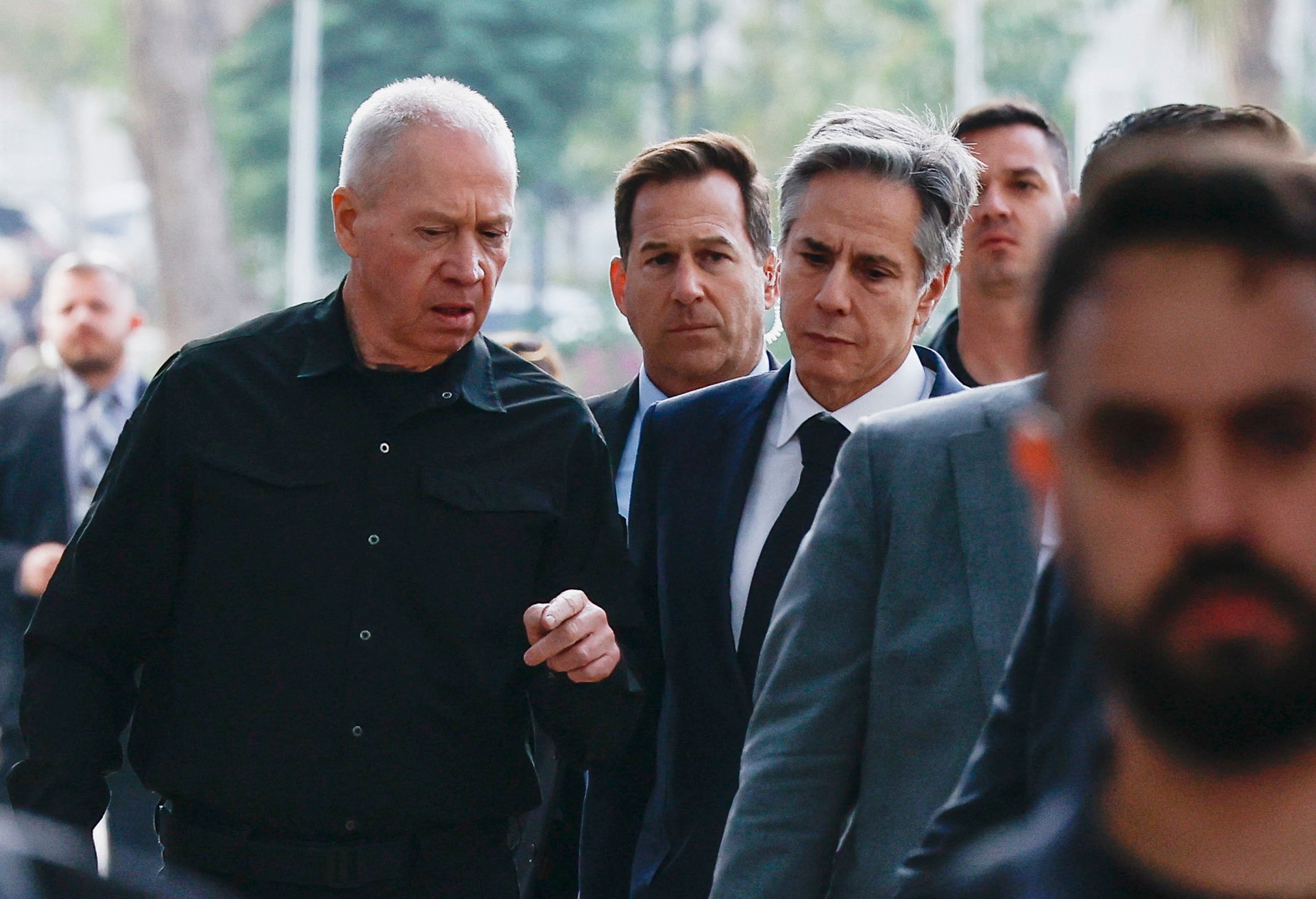Israeli Defense Minister Galant (left) with US Secretary of State Blinken (French)
Hundreds of families of Israeli prisoners in the Gaza Strip appealed to US President Joe Biden to intervene to make a prisoner exchange deal with the Islamic Resistance Movement (Hamas) a success, while Occupation Defense Minister Yoav Galant heads tomorrow, Sunday, to Washington, D.C., in his first official visit since the outbreak of the war on Gaza.
The Israeli Broadcasting Authority said that 600 families of prisoners detained in Gaza sent a letter to the US President demanding an exchange deal with Hamas.
She also said that the families of the prisoners called on Biden to work to persuade all parties - including Prime Minister Benjamin Netanyahu - to agree to any exchange deal that is appropriate according to his estimates.
In a related context, Al Jazeera's correspondent said that hundreds of demonstrators blocked a street opposite the Ministry of Defense in Tel Aviv, demanding a deal to return the detainees.
Senate anger
In the United States, the Washington Post said that 17 Democratic senators asked the Biden administration to reject Israel’s claims that it is not violating international law by restricting humanitarian aid to Gaza.
The newspaper quoted - from a statement by lawmakers - that Democratic Senators Chris Van Hollen, Dick Durbin, and Elizabeth Warren asked the State Department to reject any Israeli guarantees due to excessive and burdensome restrictions on the flow of aid overland to Gaza.
It quoted Senator Van Hollen as saying that Blinken's confirmation of the validity of the Israeli allegations would set a bad precedent globally, and that the barriers placed in front of humanitarian aid in Gaza are acceptable.
Visit Gallant
Meanwhile, the Israeli Broadcasting Corporation reported that the Minister of Defense will begin an official visit to Washington tomorrow during which he will meet with senior officials, at the invitation of his counterpart, Lloyd Austin.
Gallant Austin is scheduled to meet with Pentagon leaders, and will also meet with other senior officials in the US administration and Congress.
The Israeli Broadcasting Corporation added that Gallant will also discuss the plan to invade the city of Rafah in the south of the Gaza Strip, the course of the battles, the recovery of Israeli detainees, and the procedures for bringing aid into Gaza.
She stressed that Gallant's discussions will also include maintaining the momentum that gives Israel a military advantage in the region.
For its part, the Prime Minister's Office announced that it had sent a delegation "at the request of the American President" to discuss the ground attack that Israel is preparing in the Rafah area in the southern Gaza Strip.
Biden said - on Monday - that he asked Netanyahu to send a team to Washington to discuss ways to "avoid a large-scale operation" in Rafah.
Netanyahu insists on invading Rafah despite regional and international warnings of the possible repercussions, in light of the presence of a large number of displaced people who were forced by the occupation army to move to the area claiming that it was safe, and then later launched raids on it that resulted in martyrs and wounded.
Although Washington does not explicitly declare its categorical rejection of Israel’s invasion of Rafah, it conditions this on the existence of what it calls a plan to preserve the lives of civilians there, especially with the presence of 1.5 million civilians in the region, most of whom were displaced there from areas destroyed by bombing.
Last Tuesday, Netanyahu's office announced the sending of two of his close aides, Strategic Affairs Minister Ron Dermer and Security Advisor Tzachi Hanegbi, to hold discussions in Washington, without specifying the date of their departure.
Since the outbreak of the war on besieged Gaza on October 7, 2023, Washington has been providing Israel with the strongest possible military, intelligence, and diplomatic support, even in light of what appear to be disagreements between Biden and Netanyahu regarding the huge number of civilian casualties, and the occupation army’s restrictions on bringing humanitarian aid into the Strip. , as well as the so-called future of Gaza after the war.
Source: Al Jazeera + agencies

